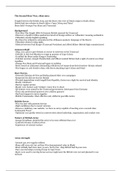The Second Boer War, 1899-1902
Fought between the British Army and the Boers who were of Dutch origin in South Africa.
British had two colonies in South Africa- Cape Colony and Natal
Boers held- Orange Free State and Transvaal
Background
-First Boer War fought 1880-81 because British annexed the Transvaal
-Discovery of gold in 1880s sparked an inrush of foreign settlers or ‘uitlanders’ meaning outlanders
-Uitlanders mostly English speaking
-By 1890s the uitlanders outnumbered the Afrikaans speakers (language of the Boers)
-Uitlanders denied voting rights
-Distrust between Paul Kruger (Transvaal President) and Alfred Milner (British high commissioner)
Jameson Raid
-1895, was a ploy to give Britain an excuse to intervene in the Transvaal
-FAILED. It led Cecil Rhodes to resign as premier of Cape Colony
-It unified the Boers under Kruger’s leadership
-Colonial secretary Joseph Chamberlain and Milner insisted Britain had a right of control over Boer
republics
-Orange Free State and Transvaal began to mobilise
-Boers issued an ultimatum demanding withdrawal of troops from their frontiers- Britain refused
-War began on 11th October 1899, with Boers attacking Cape Colony and Natal
Boer Forces
-Generals Christian de Wet and Botha planned their own campaigns
-Respected but did not fear the British
-Worried imperialism would engulf their Republic, theirs was a fight for survival and identity
-Mostly volunteers
-Had no regular armies
-Mostly were hunters and ‘trekkers’, knew how to shoot
-All farmers were armed by the Transvaal government, latest guns from Germany
-Their only professional gunners were artillery gunners
-Had local support to move supplies
-Mobile Commandos. Most effective unit, skilled at guerrilla tactics
British forces
-War was met with patriotic fervour
-High confidence due to recent victories
-However, Salisbury was realistic, ‘we have no army capable of meeting even a second-class
Continental Power’
-Optimism was quickly tested as controversies about leadership, organisation and conduct rose
Nature of British Army
-George Wyndham, declared the army to be more efficient than ever
-Cardwell reforms of 1860s/1870s
-Experience of colonial warfare
Army strength
-Around 250,000 regular soldiers
-Many still wore red, but 1st Boer War demonstrated value in Khaki
-Boers initially had more men 50,000, but by Dec. 1899 British had 84,000 men
-Navy escorted ships carrying troops to Cape Town
-Boers were used to moving horses across rough land, the British were not and planned to use
railways





